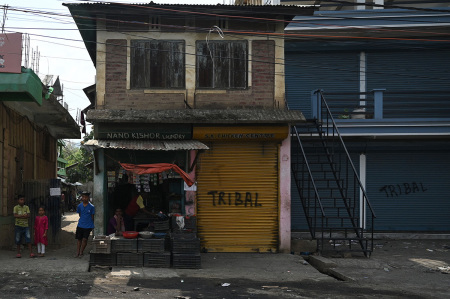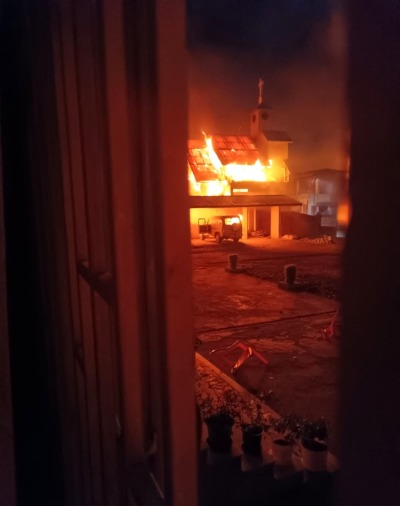Christian family narrowly escape death as home is torched amid ethnic violence in India

NEW DELHI — On the evening of May 3, an ethnic Christian in northern India’s Manipur state received a call from a relative advising her to pack up and leave home with her children immediately.
Manngaihlun Tombing, of the Kuki ethnic minority in Churachandpur, did not take it seriously, she said. The worst that could happen, she thought, was that the government would impose a curfew.
“Keeping that in mind, I quickly rushed to a nearby store and bought enough supplies to sustain us if a curfew was imposed,” Tombing said.

Little did Tombing know that she and her family would flee their home and narrowly escape death several times over the next 24 hours.
Tombing lived in the area known as Paite Veng, of the state capital, Imphal, with her husband, their two children, her mother-in-law and a domestic helper when the May 3 violence began between the predominantly Christian Kuki and the Meitei, who are majority Hindu.
Tombing did not anticipate that the ethnic clash that originated during a march to protest the demand of the Meitei community for Scheduled Tribe (ST) status would result in the killing of almost 200 people and leave 60,000 displaced. When she returned home from the market, she received a call from a Meitei friend, wife of a police officer, who warned her to leave without delay.
Tombing had barely chosen essential medicines for her children when she heard banging on the light poles on the street.
“The loud continuous sound made by hitting the iron electric pole was a signal to other attackers to quickly rush to the area to attack jointly,” Tombing told Morning Star News in a camp for the displaced in Delhi.
Her husband, Samuel Tombing, rushed into the house in a panic, having also heard the signaling. The family quickly crossed the road to church premises in a missionary compound, where they hid in a house.
“While we crossed the road, I saw the Meitei mob about 300 meters away, carrying thick wooden sticks, glass bottles, knives, etc. in their hands as they ran towards us,” Tombing said.
The caretaker of the mission compound quickly locked the gate after they entered. In the house where they took refuge, they were stunned to find 45 other Christians, Tombing said. Families with children, the elderly including a blind lady, and a pregnant mother were among those in hiding.
Soon they heard the Meitei mob attacking the church building in the compound and then breaking the glass panes of the house. The stones the mob flung to break the windows landed inside, driving some of the displaced under beds and others to the kitchen, Tombing said.
“We were so many in number and were all over the place in the house,” she said.
A man from the mob peeped inside the bedroom window where her family was hiding and peered into her eyes.
“I cannot forget those big eyes, and in that moment I thought, ‘This is the end, we are going to die — he has seen us,’” Tombing said. “I quickly closed my eyes and began to pray. They knew we were inside. They were laughing at us. We could hear them.”
The mob soon left, and the Christians considered how to escape, fearing the rioters were still at the gate. After 15 minutes, an even larger mob arrived, stopping all thought of escape. The assailants set fire to the church building and then burned the caretaker’s house before retreating.
She said she heard the Meitei mob speak in foul language of the church while setting the building ablaze.
“I heard the mob curse the church and the Christians as they burned the church,” Tombing said. “It is evident that they want to rid Manipur of the presence of Christian Kukis. It’s still a nightmare to me.”
A Meitei who lived next to the compound invited the Christians to scale the 6-foot high fence and hide outside the side of the house. Samuel Tombing and other men helped the now 50 Christians to get over the fence.
“There were women, children, elderly, a completely blind elderly woman, a full-term pregnant woman who had to jump the fencing,” Manngaihlun Tombing said.
From there the Christians witnessed the mob hours later burn the house they had taken refuge in earlier, along with a school where Tombing’s daughter studied.
“The Meitei house owner did not invite us inside their house for fear that if they are found sheltering the Kuki Christians, they, too, would not be spared,” she said.
The mob set one car after another ablaze — in many cases burning the vehicles along with the people inside, she said. Apparently unafraid of burning themselves, the assailants blew up Liquefied Petroleum Gas cylinders normally used for cooking to raze entire houses, Tombing said.
“They would celebrate with shouts of joy after burning each vehicle,” she said. “I cannot thank God enough and my Meitei friend who informed us timely so we could escape. We had a narrow getaway — they burned my house and my car.”
The Christians hid behind the boundary until 4 a.m., when armed forces arrived and escorted them to a government-run relief camp. The next day, May 5, the Tombing family left for Delhi, along with a few others from the 50 who had taken refuge together.
Targeted
Tombing and her husband saw the Meitei mobs carrying maps in their hands with church locations and Kuki homes marked on them.
“They had done their survey already,” she said. “Everything it seemed was marked way ahead of time.”
Before burning down the Tombings’ home, the assailants first vandalized it. They also bulldozed a farm the Tombings owned some distance from their house.
“How could they identify as to which farmland was ours, from all the agricultural lands?” Tombing asked.
National media recently reported that the name of the area — Paite Veng, meaning colony of the Paites, a Kuki sub-tribe — has been changed to Kwakeithal Ningthemkol, a Meitei name that means “abode of a Meitei prince.”
Lingering trauma
Tombing said they could not sleep for nearly a week after what they had witnessed. She said her children still feel they are being followed and fear they could be subject to more horrors.
“Whenever my children heard a bang or a sudden noise, they would start to scream, ‘Mummy, they are coming,’” she said, adding that her 4-year-old daughter would suddenly begin shaking when she heard sudden movement or noise. “When we are watching TV, if someone changed the channel suddenly, my youngest daughter would completely shake with fear and began to breathe heavily.”
Tombing said she was seeking trauma counseling for her daughters.
Her husband said they do not know how long the sounds and images of burning and killing would haunt them.
“It is absolutely heart-breaking to see our children dealing with anxiety issues,” Samuel Tombing told Morning Star News.
Manngaihlun Tombing asked the international Body of Christ to pray for Manipur, which continues to see clashes.
“Pray for wisdom for the authorities, memories to heal, peace to be established and re-settlement of the displaced community,” she said.
The hostile tone of the National Democratic Alliance government, led by the Hindu nationalist Bharatiya Janata Party, against non-Hindus, has emboldened Hindu extremists in several parts of the country to attack Christians since Prime Minister Narendra Modi took power in May 2014, religious rights advocates say.
India ranks No. 11 on the Christian support organization Open Doors’ 2023 World Watch List of the countries where it's most difficult to be a Christian. The country was 31st in 2013, but its position worsened after Modi came to power.
Morning Star News is the only independent news service focusing exclusively on the persecution of Christians. The nonprofit's mission is to provide complete, reliable, even-handed news in order to empower those in the free world to help persecuted Christians, and to encourage persecuted Christians by informing them that they are not alone in their suffering.





















